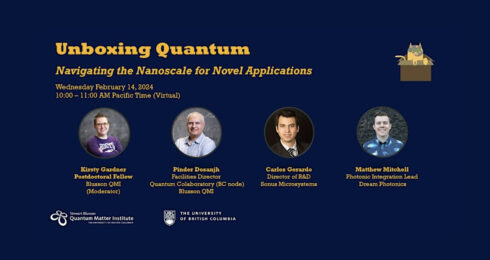The Government of Canada announced the recipients of the federal New Frontiers in Research Fund (NFRF) Exploration Stream today. Seven projects led by UBC researchers were awarded a combined total of $1.75m ($250,000 per project); three of these are led or supported by Principal Investigators at the Stewart Blusson Quantum Matter Institute (Blusson QMI). We are pleased to congratulate David Jones, Joerg Rottler, Jeff Young and Mark MacLachlan on their awards, which will support high-risk, high-reward interdisciplinary research.
“Research that takes great risks advances the way we think about the issues that impact Canadians,” said the Honourable François-Philippe Champagne, Minister of Innovation, Science and Industry. “The Government of Canada is supporting researchers who are exploring bold new directions that could change lives and position Canada at the forefront of global research and innovation.”
About the projects
Laser Ablation Spectroscopy using Dual Frequency Combs for Rapid Ore Sorting
- Principal Investigator: David Jones
- Co-applicants: Jason Jones (University of Arizona); Bern Klein (UBC Mining Engineering)
This project will attempt to use a precision measurement technique known as frequency comb spectroscopy in mining context to perform realtime evaluation of mining ore. The ultimate goal is to design, build and demonstrate a noncontact measurement method for rapid classification of ore with no sample preparation. If successful, this novel sensing technology could support standard process operation control and optimization for on-site analysis, and potentially be employed directly as an ore sorting sensor in an active mining and processing environment. It would increase sorting accuracy, reduce the amount of material that must be processed, and decrease the environmental footprint, while having a significant impact on mine economics. This technique is particularly suited for evaluating Li concentrations, which no other realtime sensor is currently capable of.
An integrated design framework for optical coatings with exceptionally low mechanical loss
- Principal Investigator: Joerg Rottler
- Co-Principal Investigator: Jeffrey Young
The two four kilometer-long Advanced LIGO interferometers in the U.S., the most sensitive gravitational wave detectors in the world, have registered the signals of more than 50 black hole and neutron star mergers. The next generation of detectors will require a significant improvement in mechanical loss in the most sensitive (10-1000 Hz) frequency range. This project establishes a “materials-by-design” framework that optimally synergizes thin film fabrication with atomistic simulations identifying the operative mechanisms of internal friction, and predicting mechanical loss that will be measured in a novel optical cryostat built at the Stewart Blusson Quantum Matter Institute. The novel highly reflective materials created will open the door to ground-breaking discoveries such as tests of general relativity in extreme spacetime curvature, a census of all stellar-mass black holes in the visible Universe, and a resolution of conflicting measurements of the expansion of the Universe.
Catcher of the rye: Spray-on netting for increasing yield in grain harvesting
- Principal Investigator: John Frostad (UBC Chemical and Biological Engineering)
- Co-applicants: Mark MacLachlan; Andrew Riseman (Land and Food Systems)
This project proposes a novel harvesting technology that consists of a spray-on netting material to physically prevent seed shattering in grain and oil-seed crops until the optimal time to harvest mature crops. Once shattering occurs, the seeds fall to the ground and cannot be harvested, so farmers must balance between avoiding shattering and harvesting immature plants, which results in losses of up to 50% of the crop. The proposed netting will be a water-based spray that solidifies into a net-like material that is nontoxic, biodegradable, and easily separated from the grain after harvest. This game-changing technology will shift the paradigm for increasing crop yield from a genetic problem to an engineering solution.
About NFRF
The New Frontiers in Research Fund (NFRF) 2020 Exploration competition has awarded funds to support 117 research projects across Canada that bring diverse disciplines together in pursuit of breakthrough ideas and high-reward outcomes. The NFRF program, a federal research funding initiative, mobilizes cutting-edge interdisciplinary, international, and transformative research that strengthens Canadian innovation and benefits Canadians.
The fund’s Exploration stream specifically targets interdisciplinary, high-risk, high-reward research that defies current models, bridges disciplines in novel ways, or tackles fundamental problems from new perspectives. The stream’s design recognizes that interdisciplinary research is often risky, but worthwhile given the potential for significant groundbreaking impact. All funded teams must demonstrate commitment to equity, diversity and inclusion in the research environment.
Read more
- UBC Researchers Supported by New Frontiers in Research Fund 2020 Exploration Grants to Pursue Breakthrough Ideas (UBC VP Research + Innovation)
- Government of Canada funds 117 innovative projects across Canada to advance groundbreaking research via Government of Canada
- Award Recipients: 2020 Exploration via Government of Canada


